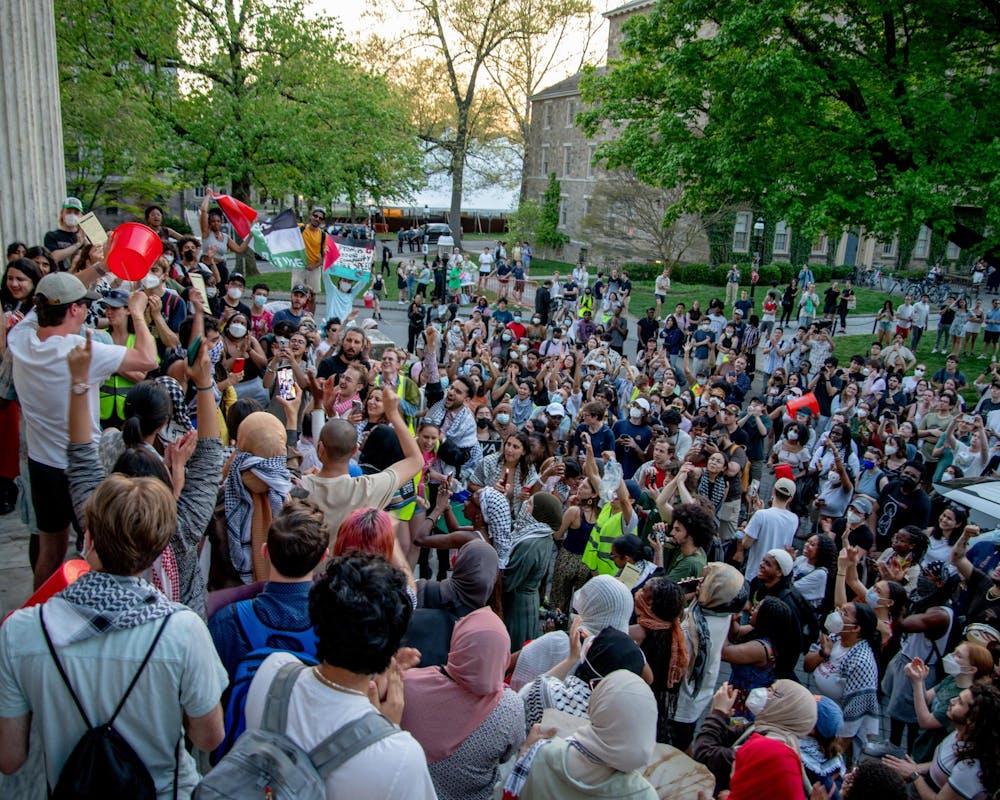The 15 students and University community members arrested during pro-Palestine protests last spring will not have their cases dismissed following a hearing on Tuesday.
Aymen Aboushi, an attorney representing the 12 students and one postdoc arrested for occupying Clio Hall, motioned to dismiss the charges of defiant trespassing, which Judge John McCarthy III ’69 ultimately rejected to hear. Citing body camera footage, he argued that the students at Clio Hall did not receive notice from the officers who arrested them that they were trespassing. Under New Jersey law, defiant trespassing occurs when someone enters a space after “knowing that he is not licensed or privileged to do so.”
Omar Qadeer, a lawyer representing the two students arrested in McCosh courtyard during the beginning of the “Gaza Solidarity Encampment,” also joined Aboushi in requesting a motion to dismiss.
McCarthy rejected the motion over concerns that the arguments raised by Aboushi would be best resolved at trial and would not be within the bounds of a motion to dismiss in municipal court.
“We don’t decide a motion for summary judgment,” he said.
Municipal Prosecutor Christopher Koutsouris called Aboushi’s argument about trespassing communication a “poisonous oversimplification.”
The University indicated in August that it would not interfere in criminal proceedings. However, both Koutsouris and Aboushi noted during the trial that they each had extensive conversations with legal counsel representing the University.
“We continue to support an outcome that minimizes the impact of the legal process on our students while maintaining student accountability,” University spokesperson Jennifer Morrill wrote in a statement to The Daily Princetonian on Tuesday.

Rights, Rules, Responsibilities — the University’s policy handbook — outlines a position distancing the administration from legal proceedings, writing that the University cannot guarantee outcomes if “outside authorities” are called upon community members.
“Members of the University involved in such cases, when their conduct is in violation of the law, cannot be guaranteed immunity either from arrest or prosecution,” the section on “Campus Misconduct and the Law” reads.
Qadeer wrote in a statement to the ‘Prince,’ “I'm disappointed at the court's handling of these matters...More disappointing is that no one seems to care that the students were all already disciplined by the school.”
Aditi Rao GS, one of the students arrested at Clio, told the ‘Prince’ that she was fine going to trial.

“I know that we have the law on our side,” Rao noted.
When the request for a motion to dismiss was rejected, Aboushi proposed a “holding date” to prevent all of the defendants from going straight to trial. Aboushi and Koutsouris gestured towards plans to negotiate plea deals for some of the defendants, while an unspecified group would submit a notice to head to trial.
“I’m sure that some will accept [a plea deal],” said Rao, pointing to the fact that six of the defendants in the Clio Hall case have since graduated. She also emphasized the time involved in a potential trial.
“You don’t have time to get called into court for several hours on a random Tuesday,” she added. Rao noted that at least one version of the plea deal — of which the prosecutor said there are two — presented a guilty plea to a municipal noise ordinance.
Chase Hommeyer ’19, who was the alum arrested at a protest at Richardson Auditorium in May, became the first person to take such a deal at a separate proceeding on Tuesday. They had previously faced charges of defiant trespass and of obstructing a government function and received a $200 fine.
Tuesday’s proceedings got off to a relatively late start after about 150 people joined the virtual hearing. Princeton Israeli Apartheid Divest (PIAD) encouraged their supporters to appear at the hearing and distributed a zoom link ahead of the start time. Around half of the attendees sported identical Zoom backgrounds reading “MERCER COUNTY: DROP THE CHARGES.” PIAD wrote in a statement to the ‘Prince’ that they hope the University will push to avoid a trial.
In the meantime, those who were students at the time of their arrest have received four years of disciplinary probation, according to a post on X from PIAD — the two other arrestees were a postdoctoral researcher and a student at the Princeton Theological Seminary. Disciplinary probation does not carry any immediate penalties, but “will be taken into account in judging the seriousness of any subsequent infraction even if the probationary period has expired.”
Ayboushi emphasized to the court that although the proceedings were in municipal court, the judge should view the case in a greater context, implicating the larger pro-Palestine cause.
“What’s at play here is significant to these students, the University, this country, and the world,” he noted.
Court cases for students arrested at pro-Palestine protests across the country continue to unfurl, although many charges have been dropped. Over the summer at Columbia, prosecutors dropped charges against protesters arrested for occupying Hamilton Hall, citing a lack of evidence. In late August, attorneys for protesters at Yale filed a motion to dismiss criminal trespass charges.
McCarthy, the judge, expressed that “civil disobedience has great consequences.”
“Martin Luther King: his letters from Birmingham Jail have great consequences. It would not have great consequences if they were written from his living room couch,” he said.
“Obviously we would all rather be sitting on a couch than in jail,” Rao told the ‘Prince.’ “I promise you, I am thinking in the spirit of liberation without going to jail.”
The protesters are due back in court on Oct. 1.
Editor’s note: This piece was updated to include comment from Omar Qadeer.
Miriam Waldvogel is an associate News editor and the investigations editor for the ‘Prince.’ She is from Stockton, Calif. and often covers campus activism and University accountability.
Head News Editor Annie Rupertus contributed reporting.
Please send any corrections to corrections[at]dailyprincetonian.com.








